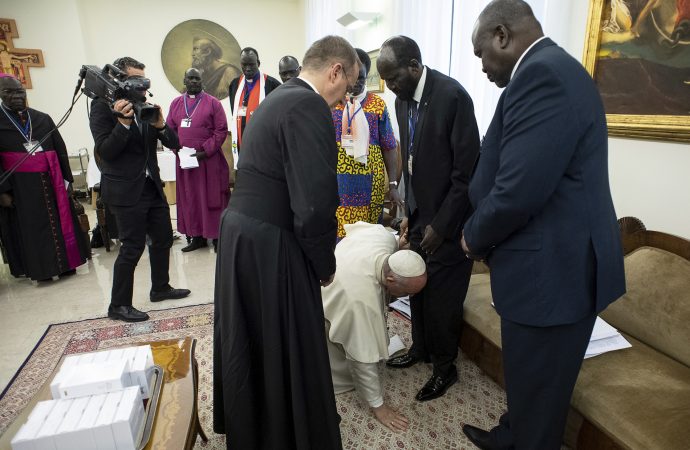Although South Sudan is one of the world’s most violence-plagued hotspots, Pope Francis has been vocal about his intention to visit as soon as security conditions allow. While peacemaking efforts are still in progress, one man close to the negotiations says it’s only a matter of time.
“I do not have dates for the visit. We only know that the will of His Holiness to visit the country is intact, that he’s paying close attention to the situation of the people…and to the developments on the ground. Sooner or later, it will happen,” Italian layman Mauro Garofalo said.
Garofalo, chief of international relations for the Sant’Egidio community, spoke to journalists July 26, the last of a three-day series of meetings in Rome with members of the National Pre-Transitional Committee of South Sudan, tasked with implementing an October 2018 peace agreement.
He was among the signatories of a recent Memorandum of Understanding between Sant’Egidio and the United States Agency for International Development, committing the two parties to join forces for peace, interreligious dialogue and anti-poverty efforts in the Middle East and sub-Saharan Africa.
Sant’Egidio, perhaps the pope’s favorite so-called “new movement,” organized the meeting. They have been an active go-between for the Vatican and South Sudan, which has long been a priority for Francis.
Francis in 2016 met with South Sudan’s Catholic bishops at the Vatican, and he planned to visit with the archbishop of Canterbury, Justin Welby, in 2017, but security conditions prevented it.
Since then, he has shown continued interest. In February 2018 he called a day of prayer and fasting for South Sudan and the Democratic Republic of the Congo; in 2018 he met with the country’s Catholic bishops again during an ad limina visit to Rome, when they met the pope and visited offices of the Roman Curia; and earlier this year, Francis hosted the South Sudanese president and opposition leader for a spiritual retreat at the Vatican, where he kissed their feet in pleading for peace.
During the visit to Rome last week, members of South Sudan’s National Pre-Transitional Committee continued discussions on how to implement the peace plan. They also met with several Vatican ambassadors to the Holy See, as well as the Vatican’s secretary for relations with the states, British Archbishop Paul Gallagher, who assured them of the Vatican’s support and urged them to “rally” Christians of all stripes for peace.
At eight years old, South Sudan is the youngest nation on earth, yet for the past three years it has been torn apart by a bloody conflict, prompting a major humanitarian crisis as millions remain displaced.
So far, around 400,000 people have been killed. According to the CIA Factbook, some 2 million other South Sudanese have sought refuge in neighboring countries since the current conflict began in December 2013, and as of as of August 2017, an additional 1.96 million South Sudanese have been internally displaced.
After several failed attempts at a ceasefire, a peace deal was finally brokered in October 2018 and signed by South Sudanese President Salva Kiir Mayardit and Vice-President Riek Machar Teny Dhurgon, who for the past five years were the leading faces of two sides of a conflict fueled by corruption, tribalism and poverty.
The official implementation deadline for that deal was set for May 12, but both sides asked for a six-month extension as they continue to work out details, and that extension was granted.
Representatives of all parties who signed the peace agreement were present at the committee meetings in Rome, including the representative for Islamic Affairs and committee vice president Gabriel Changson Chang. In comments to the press, Chang said parties are realistic about the challenges in making the deal a reality.
“We do not hide behind a narrative of success,” he said. “There are a lot of difficulties, but they are working hard to (find peace).”
The goal, he said, is to “make the impossible possible” and to stop the suffering of the South Sudanese people.
“This is our motto, and we want to make sure we realize it,” Chang said, noting that one of the greatest challenges is the effort to form one national security body, merging both government and opposition forces. Part of this “unification” will be done through new training centers where military personnel will be given a “national character” and deployed to protect South Sudan as a nation, rather than taking one side in a conflict.
“Where there is political will, there will also be a way forward,” Chang said, voicing confidence that although they are already halfway through their six-month extension, “we can still deliver.”
There are provisions in the agreement for the liberation and rehabilitation of child soldiers who had been enrolled to fight by both government and opposition forces.
“We are thankful that there are partners that are also supporting us in this process, and our coming here is also to urge this admirable body to help us reach out for support among the international community to help in the peace process,” Chang said, adding that peace in South Sudan “is instrumental for peace in the region and for the world at large.”

